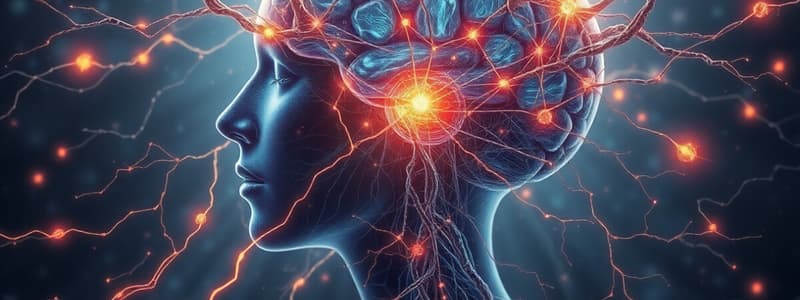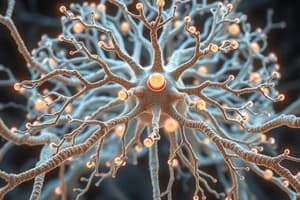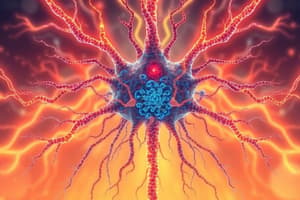Podcast
Questions and Answers
What is the main focus of biological psychology?
What is the main focus of biological psychology?
- The effects of culture on psychological phenomena
- The physical and chemical changes that affect behavior and mental processes (correct)
- The examination of mental disorders and their treatments
- The influence of social factors on behavior
Which component of the nervous system is responsible for receiving information?
Which component of the nervous system is responsible for receiving information?
- Myelin
- Axons
- Synapses
- Dendrites (correct)
What role do glial cells play in the nervous system?
What role do glial cells play in the nervous system?
- They generate action potentials
- They transmit signals between neurons
- They protect the brain from pathogens
- They hold neurons together and aid in communication (correct)
What occurs during the action potential of a neuron?
What occurs during the action potential of a neuron?
Which statement about myelin is true?
Which statement about myelin is true?
What are nodes of Ranvier?
What are nodes of Ranvier?
What happens when a neuron is depolarized?
What happens when a neuron is depolarized?
What is the primary unit of the nervous system?
What is the primary unit of the nervous system?
What is the primary role of the cerebellum?
What is the primary role of the cerebellum?
Which neurotransmitter is primarily associated with memory and movement?
Which neurotransmitter is primarily associated with memory and movement?
What function does the corpus callosum serve in the brain?
What function does the corpus callosum serve in the brain?
Which neurotransmitter is commonly associated with mood regulation and is linked to depression when dysfunctional?
Which neurotransmitter is commonly associated with mood regulation and is linked to depression when dysfunctional?
What role does the hypothalamus play in the endocrine system?
What role does the hypothalamus play in the endocrine system?
Which brain structure is responsible for initiating smooth movements?
Which brain structure is responsible for initiating smooth movements?
What condition is associated with an imbalance of serotonin?
What condition is associated with an imbalance of serotonin?
What is the primary role of endorphins in the body?
What is the primary role of endorphins in the body?
What are the two main types of cells in the nervous system?
What are the two main types of cells in the nervous system?
Which hormone does the pituitary gland release to stimulate the adrenal glands?
Which hormone does the pituitary gland release to stimulate the adrenal glands?
What function does the autonomic nervous system primarily serve?
What function does the autonomic nervous system primarily serve?
What is the role of GABA in the brain?
What is the role of GABA in the brain?
How does the brainstem function in relation to the brain?
How does the brainstem function in relation to the brain?
What is the primary role of neurotransmitters in the nervous system?
What is the primary role of neurotransmitters in the nervous system?
What happens during an excitatory postsynaptic potential?
What happens during an excitatory postsynaptic potential?
Which structure carries signals away from the cell body?
Which structure carries signals away from the cell body?
What is the effect of an inhibitory postsynaptic potential on a neuron?
What is the effect of an inhibitory postsynaptic potential on a neuron?
Which part of the nervous system transmits information from the senses to the CNS?
Which part of the nervous system transmits information from the senses to the CNS?
What is the primary function of the axon in a neuron?
What is the primary function of the axon in a neuron?
What initiates a postsynaptic potential in the dendrite?
What initiates a postsynaptic potential in the dendrite?
What is the role of the sympathetic nervous system?
What is the role of the sympathetic nervous system?
What is characterized by a short rest period between action potentials?
What is characterized by a short rest period between action potentials?
Which part of the nervous system is primarily responsible for involuntary, unlearned behaviors?
Which part of the nervous system is primarily responsible for involuntary, unlearned behaviors?
What term describes neural networks that operate together to perform complex functions?
What term describes neural networks that operate together to perform complex functions?
What function does the reticular formation primarily serve?
What function does the reticular formation primarily serve?
Where is auditory information processed in the brain?
Where is auditory information processed in the brain?
Which structure is primarily involved in the formation of new memories?
Which structure is primarily involved in the formation of new memories?
What role does the hypothalamus play in the brain?
What role does the hypothalamus play in the brain?
Which part of the cerebral cortex is specifically associated with voluntary movements?
Which part of the cerebral cortex is specifically associated with voluntary movements?
What is the primary function of the corpus callosum?
What is the primary function of the corpus callosum?
Which structure is part of the hindbrain and controls blood pressure and heart rate?
Which structure is part of the hindbrain and controls blood pressure and heart rate?
What does lateral dominance (lateralization) refer to?
What does lateral dominance (lateralization) refer to?
Which structure is involved in fear and reward learning?
Which structure is involved in fear and reward learning?
Flashcards
Biological Psychology
Biological Psychology
The study of the physical and chemical changes that cause and occur in response to behavior and mental processes.
Nervous System
Nervous System
The network of cells that allows an organism to gather information about its surroundings and respond accordingly.
Neurons
Neurons
The fundamental units of the nervous system responsible for communication.
Glial Cells
Glial Cells
Signup and view all the flashcards
Axons
Axons
Signup and view all the flashcards
Dendrites
Dendrites
Signup and view all the flashcards
Synapses
Synapses
Signup and view all the flashcards
Action Potential
Action Potential
Signup and view all the flashcards
Myelin
Myelin
Signup and view all the flashcards
Nodes of Ranvier
Nodes of Ranvier
Signup and view all the flashcards
Refractory Period
Refractory Period
Signup and view all the flashcards
Neurotransmitters
Neurotransmitters
Signup and view all the flashcards
Neural Receptors
Neural Receptors
Signup and view all the flashcards
Postsynaptic Potential
Postsynaptic Potential
Signup and view all the flashcards
Excitatory Postsynaptic Potential (EPSP)
Excitatory Postsynaptic Potential (EPSP)
Signup and view all the flashcards
Inhibitory Postsynaptic Potential (IPSP)
Inhibitory Postsynaptic Potential (IPSP)
Signup and view all the flashcards
Acetylcholine
Acetylcholine
Signup and view all the flashcards
Norepinephrine
Norepinephrine
Signup and view all the flashcards
Serotonin
Serotonin
Signup and view all the flashcards
Dopamine
Dopamine
Signup and view all the flashcards
GABA
GABA
Signup and view all the flashcards
Glutamate
Glutamate
Signup and view all the flashcards
Hindbrain
Hindbrain
Signup and view all the flashcards
Midbrain
Midbrain
Signup and view all the flashcards
Forebrain
Forebrain
Signup and view all the flashcards
Neural Plasticity
Neural Plasticity
Signup and view all the flashcards
Endocrine System
Endocrine System
Signup and view all the flashcards
Hormones
Hormones
Signup and view all the flashcards
Pituitary Gland
Pituitary Gland
Signup and view all the flashcards
Study Notes
Biological Psychology
- Biological psychology is the study of the physical and chemical changes that cause and occur in response to behaviour and mental processes.
- All behaviour and mental processes are based on biological processes.
- All biological processes are influenced by the environment.
Nervous System
- The nervous system is made up of cells that allow an organism to gain information about its internal and external environment and respond appropriately.
- The nervous system's main functions are to receive, process, and transmit information.
Neurons
- Neurons are the fundamental units of the nervous system and are crucial for communication.
- Glial cells are the cells in the nervous system that support and help neurons communicate.
- Neurons have an outer membrane, a cell body containing the nucleus, and mitochondria.
Structure of Neurons
- Axons are fibers that carry signals from the body of a neuron to other neurons.
- Dendrites are fibers that receive signals from other neurons' axons and carry them to the cell body.
- Synapses are tiny gaps between neurons where communication occurs.
Action Potential
- An action potential is an abrupt wave of electrochemical changes traveling down an axon.
- Myelin is a fatty substance that wraps around some axons and speeds up the action potential.
- Nodes of Ranvier are gaps in the myelin sheath that allow the action potential to regenerate.
- A refractory period is a brief rest period following an action potential.
Synapses and Communication
- Neurotransmitters are chemicals that help transfer signals from one neuron to another.
- Neural receptors are specialized cells that detect specific forms of energy and convert them into nerve cell activity.
Postsynaptic Potential
- When a neurotransmitter binds to its receptor on the postsynaptic cell, it can cause changes in the cell's membrane potential.
- An excitatory postsynaptic potential (EPSP) depolarizes the membrane, making it more likely to fire an action potential.
- An inhibitory postsynaptic potential (IPSP) hyperpolarizes the membrane, making it less likely to fire an action potential.
Neurotransmitter Function
- Acetylcholine plays a role in memory and movement.
- Norepinephrine relates to mood, sleep, and learning.
- Serotonin is involved in mood, appetite, and impulsivity.
- Dopamine is connected to movement and reward.
- GABA inhibits brain activity.
- Glutamate is an excitatory neurotransmitter involved in memory.
Brain Divisions
- The hindbrain controls vital functions, arousal, attention, and movement coordination.
- It includes the cerebellum, medulla oblongata, and reticular formation.
- The midbrain relays sensory signals and creates automatic responses to stimuli.
- The forebrain is responsible for complex behaviors and mental processes.
- Major forebrain structures include the amygdala, cerebral cortex, corpus callosum, hippocampus, hypothalamus, and thalamus.
Neural Plasticity
- The brain has the ability to create new synapses and change the strength of existing ones.
Endocrine System
- The endocrine system uses hormones to regulate various bodily functions.
- Hormones provide feedback to the brain and the pituitary gland.
- The brain controls the secretion of hormones, governing stress responses like "fight or flight."
Key Concepts
- Each neuron communicates with others via neurotransmitters crossing the synapse.
- The somatic nervous system controls voluntary muscle movements, while the autonomic nervous system regulates involuntary functions.
- The hippocampus plays a role in memory formation, and its shrinkage can contribute to memory problems like those seen in Alzheimer's disease.
- GABA is the main neurotransmitter that inhibits brain activity.
- Glutamate can cause brain damage after a stroke.
- The pituitary gland releases adrenocorticotropic hormone (ACTH), which triggers the release of cortisol from the adrenal glands.
Studying That Suits You
Use AI to generate personalized quizzes and flashcards to suit your learning preferences.




